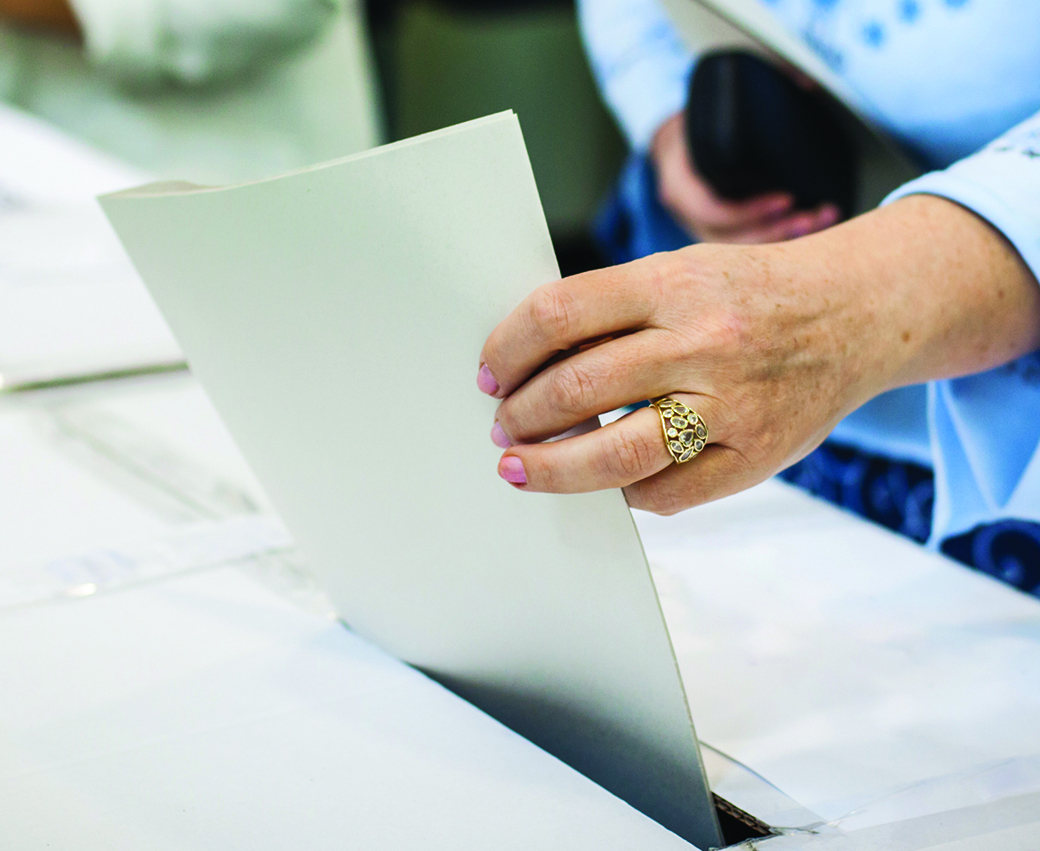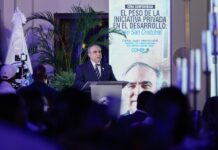[:en]ELIZABETH, NJ — Rossana Madeira is a wife and a mother. She is also an undocumented immigrant.
But five years ago, because of the economic hardships that her family experienced, Rossana realized that she could no longer remain silent and stay in the shadows.
“I can’t live in fear because of my immigration status,” she said. “I need to exercise my rights as a person.”
A native of Mexico, Rossana knows that she cannot vote. Yet, she also understands well that she could influence her relatives, friends and other immigrants— who have the right to vote— to participate in the elections.
“If I don’t speak out and exercise our rights, no politician will take [undocumented immigrants], like me, into consideration,” added Rossana, who is now a member of Make the Road-New Jersey, where she has participated in mobilizing campaigns and protests that advocate for the rights of immigrants.
“Even if we do not have legal papers, we pay taxes and bring our work to this country,” she added. “It is just right for [this country] to respect our rights.”
Through her community activism, the Mexican mother managed to get her two U.S.-born daughters— Sara, 23, and Esther, 16— to do their part in the elections.
“I was scared listening to Donald Trump’s anti-immigration stance,” Sara said. “That really motivated me to vote.”
For the first time, Sara voted in the presidential elections last November. And this year, she again voted in the New Jersey gubernatorial primaries.
Despite feeling frustrated and disinterested in politics, she confessed that there are two people who drive her to participate in the elections and community activism: her undocumented parents.
“For me, it is very important that a governor be chosen to take into account the problems of the immigrant community,” said Sara, who is ready to vote for the third time this coming November in the New Jersey gubernatorial elections.
The young woman said she supports the Democratic gubernatorial candidate, Phil Murphy, who has expressed his support for sanctuary cities, drivers’ licenses and municipal IDs for undocumented immigrants, increasing the minimum wage to $15 an hour.
Sara also said that she likes Murphy’s policies against wage theft and labor abuse, and his support for merit-based financial aid for all young people in the state who want to study at New Jersey universities and community colleges, regardless of their immigration status.
Woodcliff Lake Mayor Carlos Rendo, who is of Cuban descent, is running for lieutenant governor on the same ticket as Republican gubernatorial candidate, Kim Guadagno. Guadagno is currently the state’s lieutenant governor.
Sara and her mother do not support her.
“We feel that she will just be a continuation of Gov. Chris Christie’s administration,” Sara said, “and we think Christie has done nothing for immigrants in New Jersey.”
Rossana and her husband, Wellington Madeira, met in Elizabeth, New Jersey. They have lived there since 1989.
When she first came to the United States, Rossana recalled, the situation for undocumented immigrants was less repressive. Work was abundant, she said, and it was a lot easier to obtain a driver’s license without showing proof of immigration status.
“Now everything has changed,” she added.
Currently, New Jersey is not among the 12 states (and Washington, D.C.) that allow undocumented immigrants to apply for a driver’s license.
For 20 years, said Rossana, her husband worked as a limo driver in New York City. His income allowed their family to meet their needs.
But because Wellington, who is a native of Brazil, is also undocumented, he could no longer get a driver’s license, unless the state of New Jersey would change its policy and extend driving privilege cards to residents who do not have lawful immigration status. He lost his job, and their family has since faced economic hardships.
“We were up to the point of being homeless,” Rossana said. “We could not pay our rent and so we had to live temporarily with relatives and friends.”
While Rossana remains optimistic that someday she will legalize her immigration status and will be able to vote, Wellington is skeptical.
“All I have achieved is the product of my own work and with the help of God, but nobody has given me anything,” said Wellington. “If I do not work, we do not eat.”
In every election year, politicians promise to help undocumented immigrants, Wellington said, but once elected they do nothing.
“It’s not fair that in our 28 years of living in the United States, working and paying taxes, the only person who could help us fix our immigration problem is our daughter [who was born in this country],” Wellington said. “I do not have time for politics. I just have to work to earn money.”
But despite his discontent with politics and politicians, Wellington feels proud that his wife and daughter are trying to make a difference in their community.[:es]Sara Madeira votó por primera vez en las elecciones presidenciales del pasado mes de noviembre. El temor a la retórica antimigrante del entonces candidato Donald Trump fue el principal motivo para participar en los comicios. Este año, 2017, la joven de 23 años votó por segunda vez en las elecciones primarias para elegir el candidato a la gobernación de Nueva Jersey. Sara confiesa que a pesar de no sentirse muy interesada por la política, detrás de ella hay una persona que la impulsa a participar en las elecciones y el activismo comunitario, su madre: Rossana Madeira.
Rossana, oriunda de México, aprendió hace cinco años que no se puede permanecer callado, en la sombras, con temor a demandar sus derechos, por el simple hecho de ser indocumentado. Ella sabe que no puede votar, pero comprende muy bien que si puede influenciar a sus familiares, amigos y a otros inmigrantes que tienen el derecho al voto, a participar en las elecciones.
Rossana y su esposo, Wellington Madeira, oriundo de Brasil, viven en Estados Unidos desde 1989. La ciudad de Elizabeth, en el condado de Unión, ha sido su casa. Cuando llegaron a este país la situación para los inmigrantes indocumentados era menos represiva. Abundaban los trabajos y podían obtener licencias de manejar. Wellington durante 20 años se dedicó a trabajar como conductor de limosinas en la ciudad de Nueva York. Sus ingresos le permitía a su familia tener una vida sencilla pero sin necesidades.
Pero cinco años atrás todo cambio. Wellington no pudo renovar su licencia de conducir por las restricciones a los indocumentados. Perdió el trabajo y así comenzaron las necesidades económicas de su familia, al punto de quedar sin vivienda por no poder pagar el alquiler y tener que mudarse a vivir temporalmente en casas de parientes y amistades.
Fue así como Rossana comprendió que si los indocumentados no alzan su voz y participan para reclamar sus derechos, ningún político va a tomarlos en consideración. De allí que comenzó a involucrase en su comunidad y se unió a la organización Se Hace Camino NJ (Make the Road, NJ). Junto a esta organización ha participado en diferentes campañas, iniciativas y protestas para reclamar los derechos de la comunidad inmigrante.
“Aunque no tengamos papeles, los inmigrantes indocumentados pagamos impuestos y aportamos con nuestro trabajo a este país. Es justo que se nos respeten nuestros derechos”, argumenta Rossana.
A través de su activismo comunitario la mexicana logró que sus dos hijas nacidas en Estados Unidos, Sara y Esther, de 16 años, se interesen en las elecciones.
“Para mi es muy importante que se elija a un gobernador que tome en cuenta los problemas de la comunidad inmigrante”, dice Sara, quien está lista para votar por tercera vez el próximo mes de noviembre en las elecciones para el nuevo gobernador del Estado.
La joven señala que apoya al candidato demócrata para la gobernación, Phil Murphy, quien ha manifestado públicamente y en reuniones con organizaciones pro inmigrantes su apoyo a las ciudades santuarios, las licencias de conducir para los inmigrantes indocumentados, el incremento del salario a $15 la hora, las identificaciones municipales, políticas contra el robo de salario y el abuso laboral, ayuda financiera estatal para todos los jóvenes que quieran estudiar en la universidad y colegios comunitarios del estado, sin importar su estatus migratorio, entre otras medidas que beneficiaría a la comunidad inmigrante del estado.
Pese a que el compañero de fórmula de la candidata republicana Kim Guadagno para vicegobernador es un hispano, el alcalde Carlos Rendo, Sara y su madre no apoyan a Guadagno, por considerar que la candidata y actual vicegobernadora será una continuación del gobierno de Chris Christie, de quien opinan no ha hecho nada por los inmigrantes. Del alcalde Rendo dicen no conocer su trayectoria ni sus propuestas.
Rossana ha logrado motivar a su hija a que participe en los comicios electorales, y espera ansiosa poder algún día votar en las elecciones de este país luego de que logre regularizar su situación migratoria. Pero su entusiasmo no ha contagiado a su esposo, quien se mantiene reacio a la política.
“Yo todo lo que he logrado ha sido con mi trabajo y con la ayuda de Dios, a mi nadie me ha dado nada, si no trabajo no comemos”, afirma Wellington Madeira, quien agrega que en cada elección los políticos dicen que van ayudar a los inmigrantes indocumentados y luego que están en el gobierno no hacen nada por ellos. “No es justo que en 28 años viviendo en este país, trabajando y pagando impuestos, no sea sino hasta ahora que vamos a poder tener documentos porque nuestra hija nos está pidiendo ante inmigración. Yo no tengo tiempo para la política, tengo que trabajar para ganar los centavos”.
Pese a su apatía y descontento hacia los políticos, Wellington no le molesta que su esposa y su hija traten de lograr cambios a través del activismo comunitario y el voto.[:]




